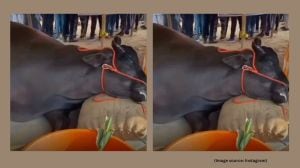The irony in Malaysia’s ‘orangutan diplomacy’
The country is facing claims of unsustainability against palm oil plantations. This offer of an ape for oil, may not help that
 For Malaysia, facing pressure from environmental groups due to the deforestation caused by expanding palm oil plantations, its diplomatic gift may be laden with far more irony than intended.
For Malaysia, facing pressure from environmental groups due to the deforestation caused by expanding palm oil plantations, its diplomatic gift may be laden with far more irony than intended. Animals can make for great PR. Just as once upon a time, a dog, horse or ermine in a royal portrait could communicate a monarch’s qualities (fidelity, power and purity, respectively), in the modern era, animals are used by nations to signal commitment to certain values. For decades, China used the giant panda to make diplomatic overtures and thaw cooler-than-ideal relations with other nations.
Now, inspired by the success of China’s “panda diplomacy” — few, after all, can resist the cuddly black-and-white bear — Malaysia’s commodities minister Johari Abdul Ghani has said that orangutans will be gifted to trade partners who buy the country’s palm oil. This, he believes, could be a way for Malaysia to distance itself from accusations of unsustainability made against palm oil plantations. History, however, shows that even the most exotic or beautiful of animals can’t make up for everything.
Last year, for example, amid diplomatic tensions between the US and China over a range of issues, reports began circulating of pandas in American zoos being in poor health, leading to a high-octane campaign in China for the return of Ya Ya the panda from Memphis Zoo.
Further back in history is the example of Soliman the elephant, given as a wedding gift by King John III of Portugal to Archduke Maximilian of Austria in 1551. The pachyderm’s arrival in Vienna reportedly led to a strain in the latter’s marriage as not only did Soliman steal the spotlight during the royal couple’s honeymoon, the Archduke himself paid more attention to the latest addition in his menagerie than to his new bride. The only one of the great apes in Asia, the orangutan is an endangered species that is found only in the tropical forests of Borneo (Malaysia and Indonesia) and Sumatra (Indonesia).
For Malaysia, facing pressure from environmental groups due to the deforestation caused by expanding palm oil plantations, its diplomatic gift may be laden with far more irony than intended.



- 01
- 02
- 03
- 04
- 05




























